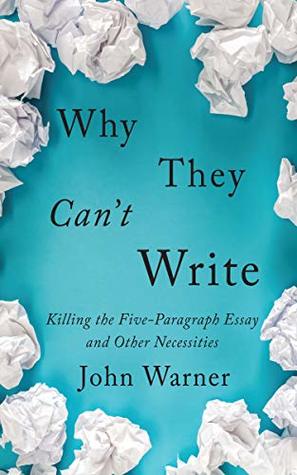More on this book
Community
Kindle Notes & Highlights
by
John Warner
Read between
December 20, 2018 - January 2, 2019
To write is to make choices, word by word, sentence by sentence, paragraph by paragraph. Writers choose what they want to write about, whom they want to write to, and why they’re writing.
The writing need not be accurate or well argued, and it definitely doesn’t need to be interesting; it merely needs to seem like something that could be accurate and well argued if we actually cared enough to read it closely.
Almost no one talks about what they want to say, the types of writing they’re interested in, or what kind of writing they may have to do in the future. They do not recall a favorite example of their writing. Very few express ever having enjoyed any act of writing.
If you want to learn to play guitar, you might take lessons from an expert, but mostly it’s about locking yourself in your room and practice, practice, practice, until you eventually start to make more and more pleasing noises.
So, if we want to do better at helping students learn to write, it’s worth asking: What are we doing when we’re writing?
Other times as I write, the idea will shift based on the thinking I am doing during the writing itself. What I thought I wanted to say will be altered by the saying.
Some part or parts of what I am about to articulate about the specific characteristics of the writer’s practice will be unknown to me as I first type these words introducing them.
The writing-related tasks we frequently visit upon students would prove difficult for even highly experienced writers.
neglect for the big-picture conditions
we need to encourage “students to give their essays the right shape for the thought that each student has.”
until students discover this truism on their own, often by doing the opposite and seeing the negative result,
School stopped being about learning,”
“I don’t think professor Blum likes college students.”
For so long, school has been about performance divorced from learning, so it’s difficult to find value in anything other than an A.
I tell students that writing is an “extended exercise in failure,” but it is a noble failure, a failure born of lofty, self-generated goals, where we reach for the stars and land on the moon.
It is hard to imagine a less conducive atmosphere in which to learn anything, let alone practice writing, an activity that requires time, space, and freedom to fail.
Resilience is the ability to get up when you’ve fallen down, to learn from your own failures.
They are aware that these assessments are asking them to produce BS.
Being asked to write in a variety of genres and contexts is lost. Reading itself is a chore,
the single most important factor for employee engagement is believing that they are “making progress on a project that matters.”11
They have rarely been required to distill or synthesize an argument to its essence, a higher order task than mere comprehension.
Put another way, they’ve spent a lot of time examining trees without being required to describe the forest.
The champions of algorithms boast about how the feedback is “instant,” but we know that an important part of the writing process is extended thinking and contemplation, some of which clearly happens subconsciously over time.
From the student perspective, a lot of what happens in school takes the form of folklore. The assumption seems to be: if it’s school, if it comes from a teacher, it’s important.
I'm reminded of the story about the teacher who, on the first day of class, told students there will be a lie in every lecture.
spend much less time worrying about the writing as demonstrated through largely meaningless assessments and instead pay intention to the writers themselves.
Current common approaches for teaching writing are simultaneously too punishing and not nearly challenging enough.
But when students say a class was “hard,” they often mean “confusing” or “arbitrary,” rather than stimulating and challenging.
have experienced a deeply impoverished notion of what writing does and how it works.
SOMETHING LIKE THIS, BUT NOT SAYING IT SO DUMB.
On the first day of class I tell students that writing is a pathway to being a better and more contented human being.
writing is a route toward the joy of discovery, of using writing as a tool to understand myself and the world. I am at my best when during the process I am surprised by what shows up on the page.
want them to approach each writing occasion from scratch. Every writing occasion is a new problem to solve, a new experience, and a chance to explore and improve one’s practice.
When students lack a big-picture concept for what a piece of writing is expected to achieve in terms of a given rhetorical situation (audience/message/purpose/genre), these disconnects happen.


